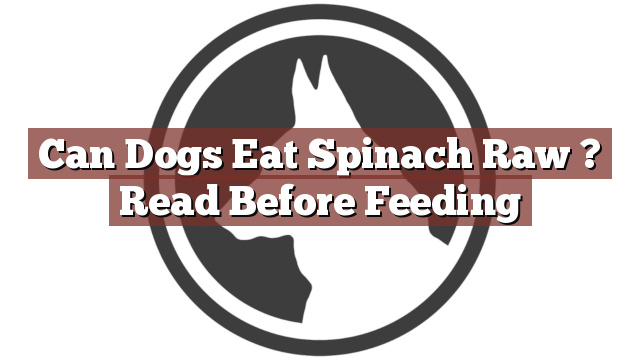Understanding Your Dog’s Dietary Needs
As a responsible dog owner, it is crucial to understand your canine companion’s dietary needs. Providing a balanced and nutritious diet is essential for their overall health and well-being. While dogs are primarily carnivorous, they can also benefit from certain fruits and vegetables in their diet. However, it is important to be aware of which foods are safe for dogs to consume and in what quantities.
Can Dogs Eat Spinach Raw? Read Before Feeding
One common question that dog owners often ask is, "Can dogs eat spinach raw?" The answer is yes, dogs can indeed consume spinach in its raw form. Spinach is packed with essential nutrients such as vitamins A, C, and K, as well as iron, fiber, and calcium. These nutrients can offer numerous health benefits to dogs when included in their diet.
However, it is crucial to note that while dogs can eat spinach raw, it should always be served in moderation. Large amounts of spinach may cause digestive issues, including diarrhea or stomach upset. It is advisable to introduce spinach gradually into your dog’s diet and monitor their response to ensure they tolerate it well.
Pros and Cons of Feeding Spinach to Dogs
Feeding spinach to your dog has several advantages. Firstly, spinach is low in calories and can be a healthy addition to their diet without causing weight gain. Secondly, the high fiber content in spinach helps promote healthy digestion and can alleviate constipation in dogs. Additionally, the abundance of vitamins and minerals in spinach supports a strong immune system, healthy vision, and bone strength in dogs.
On the other hand, there are a few considerations to keep in mind when feeding spinach to your furry friend. Spinach contains oxalic acid, which can interfere with calcium absorption in dogs, potentially leading to kidney or bladder stones. Therefore, it is important not to overdo it and to ensure your dog’s overall diet is balanced. Additionally, if your dog has a history of urinary issues, it is best to consult with your veterinarian before introducing spinach into their diet.
Conclusion: Considerations for Including Spinach in Your Dog’s Diet
In conclusion, dogs can eat spinach raw, but it should be given in moderation. Spinach offers various health benefits including essential vitamins and minerals, as well as high fiber content aiding in digestion. However, it is important to be cautious of potential risks such as oxalic acid interfering with calcium absorption. As with any dietary changes, it is recommended to consult with your veterinarian to ensure spinach is suitable for your dog’s specific needs and to determine the appropriate serving size.
By understanding your dog’s dietary needs and making informed choices, you can provide them with a balanced diet that supports their overall health and well-being.
Thank you for taking the time to read through our exploration of [page_title]. As every dog lover knows, our furry friends have unique dietary needs and responses, often varying from one canine to another. This is why it's paramount to approach any changes in their diet with caution and knowledge.
Before introducing any new treats or making alterations to your dog's diet based on our insights, it's crucial to consult with a veterinarian about [page_title]. Their expertise ensures that the choices you make are well-suited to your particular pet's health and well-being.
Even seemingly harmless foods can sometimes lead to allergic reactions or digestive issues, which is why monitoring your dog after introducing any new food item is essential.
The content provided here on [page_title] is crafted with care, thorough research, and a genuine love for dogs. Nevertheless, it serves as a general guideline and should not be considered a substitute for professional veterinary advice.
Always prioritize the expert insights of your veterinarian, and remember that the health and happiness of your furry companion come first.
May your journey with your pet continue to be filled with joy, love, and safe culinary adventures. Happy reading, and even happier snacking for your canine friend!

